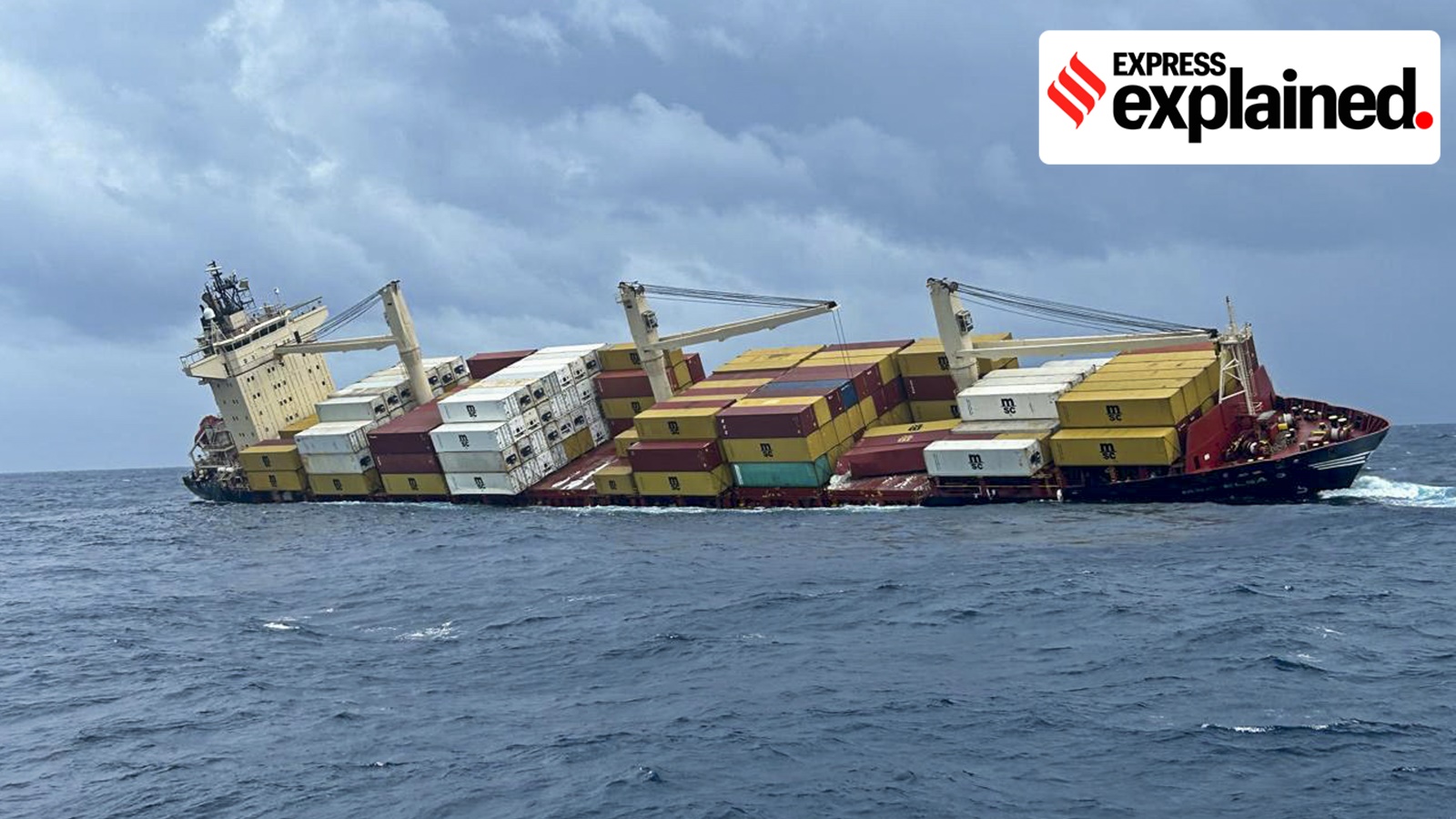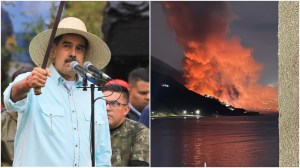Capsized ship off Kerala coast triggers oil spills concerns: All you need to know
Capsized Ship Kerala Coast: What is known so far, and what advisories have been issued? Why are oil spills often disastrous for the local ecosystem? We explain.
 The Liberian container vessel, carrying marine fuel, that developed a critical 26-degree list nearly 38 nautical miles southwest of Kochi on Saturday, tilts further in the sea off the coast of Kerala, in Kochi, Sunday, May 25, 2025. (PTI)
The Liberian container vessel, carrying marine fuel, that developed a critical 26-degree list nearly 38 nautical miles southwest of Kochi on Saturday, tilts further in the sea off the coast of Kerala, in Kochi, Sunday, May 25, 2025. (PTI)Capsized Ship Kerala Coast: A Liberian-flagged cargo ship carrying 640 containers onboard, including 13 hazardous cargoes, capsized and sank in the sea off the coast of Kerala on Sunday (May 25). All crew members were rescued by the Indian Coast Guard and a Navy ship, but the incident has raised fears of an oil spill.
The Coast Guard said the ship Saksham, equipped with pollution response equipment, was positioned to respond to any oil spill scenario. On Monday, PTI reported police saying that some containers had started washing ashore, along the southern Kollam coast. What happened, and what advisory has been issued to the locals?
How did the ship capsize?
According to the Indian Coast Guard (ICG), the MSC ELSA 3 vessel capsized rapidly in the early hours of Sunday “due to flooding in one of the holds”. A hold is a section below deck where the cargo is stored.
“The vessel was carrying 640 containers, including 13 containing hazardous cargo and 12 with calcium carbide. Additionally, the ship had 84.44 metric tonnes of diesel and 367.1 metric tonnes of furnace oil in its tanks,” the ICG said in a post on X.
“ICG aircraft with advanced oil spill mapping technology are undertaking an assessment of the situation. Presently, no oil spill has been reported,” it added. The vessel departed for Kochi from Vizhinjam port on Friday, PTI reported.
What is an oil spill?
Natural disasters, human error, or equipment failure can trigger accidents involving oil tankers or ships. When oil spills into water, it rapidly spreads. Due to its lighter density, it forms a layer over water, obstructing sunlight and disrupting photosynthesis in marine plants and phytoplankton – organisms crucial for oxygen production. Marine animals also consume phytoplankton, which form the base of multiple food chains.
Marine animals face immediate dangers from toxic exposure. With oil coating the feathers of birds, they may lose their insulation abilities, leading to hypothermia and drowning. The US Environmental Protection Agency (EPA) notes that fish and invertebrates may also endure challenges with reproduction and growth.
The environmental consequences are influenced by factors such as the type of oil, the volume of the spill, weather conditions, and proximity to sensitive ecosystems.
In more severe cases, the impact can be felt for decades. The 2010 Deepwater Horizon oil spill in the Gulf of Mexico is among the largest accidental oil spills in history. Starting April 20, 2010, over 4 million barrels of oil flowed over 87 days into the Gulf of Mexico, killing thousands of wildlife creatures.
Are there norms for preventing oil spills?
The International Convention for the Prevention of Pollution from Ships (MARPOL) governs oil spills. It evolved from several older agreements and led to a protocol issued in 1978 following several oil spill disasters in the 1970s. India is also a signatory.
The MARPOL Convention has six annexes, covering prevention of pollution from ships by Oil, Noxious liquid substances, Dangerous goods in packaged form, Sewage, Garbage and Air pollution from ships.
It is enforced with the help of domestic legislation, such as the Merchant Shipping Act in India, which has provisions on civil liability and pollution prevention certificates. Indian ships and ships in Indian waters are mandated to follow these regulations. Ports also maintain oil spill contingency plans to handle local cases, while the Indian Coast Guard is the nodal agency.
How are oil spills cleaned?
Some methods are skimming, in situ burning and releasing chemical dispersants. Skimming involves removing oil from the sea surface before it can reach sensitive areas along the coastline. In situ burning means burning a particular patch of oil after it has concentrated in an area.
Releasing chemical dispersants helps break down oil into smaller droplets, making it easier for microbes to consume and further break it down into less harmful compounds.
However, despite technological advancements, cleaning oil spills is challenging. Oil spreads quickly, and rough seas and strong currents complicate cleanup efforts. Oils vary in properties, with some sinking or emulsifying with water and making separation tough. Methods like chemical dispersants can harm marine life, and manual cleanup is labour-intensive and often ineffective in remote areas.
What should the local population do now?
The Kerala State Disaster Management Authority (KSDMA) has cautioned the general public against touching any cargo containers or oil that may wash ashore.
They have also urged people to immediately inform the police if they spot any containers or oil on the shore. Additionally, they said oil films could appear along parts of the coast.
The Indian National Centre for Ocean Information Services (INCOIS), under the Ministry of Earth Sciences, on Sunday said, “Based on hypothetical simulations, the spilled oil pollutant can reach the coastal stretch of Alappuzha, Ambalapuzha, Arattupuzha and Karunagappally within 36-48 hours of release. These coastal zones are at risk of contamination and should be given prompt attention to minimise potential environmental impact.”
- 01
- 02
- 03
- 04
- 05






































